 |
 |
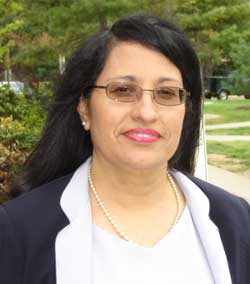
|
|
Egda M. Morales-Ramos, Biology Teacher, Gabriela Mistral High School, San Juan, Puerto Rico, and Albert Einstein Distinguished Educator Fellow, National Science Foundation, Arlington, Virginia
|
1. I chose this career because...
2. My typical workday involves...
3. What I like best/least about my work...
4. My career goals are...
5. When I'm not working, I like to...
6. My teaching awards...
|
|
1. I chose this career because...
|
Back to Top

|
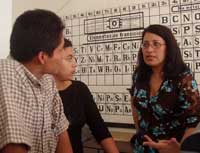
|
|
At a workshop, Egda asks students from the University of El Salvador some questions to guide them in the analysis of an experiment they were conducting.
|
I chose to become a biology teacher because it gave me the opportunity to help students explore a variety of interesting aspects of Biology that influence our relationship with the surrounding environment.
Since I was a child, I have been interested in the science field, although for years I didn’t have a clear idea of which specific area. My preference for biology developed during my high school years. It was not an easy decision, because many of my teachers kept me interested in many different subjects. I can remember them as having a good sense of humor and being committed to making every lesson important and interesting. That made my career decision difficult, because I came to like all the subject areas. In the end, I decided that I would like to be a doctor, and pursued a Bachelor’s degree in Natural Sciences with a major in Biology.
Instead of going to medical school, I went to work in the pharmaceutical industry after graduating. I found that the work didn’t bring me satisfaction. Then I started teaching in a private school and eventually obtained a certificate as a biology teacher. I think that was the most important and rewarding career decision I have ever made. Since I have been teaching middle and high school students, each day is full of satisfaction but challenges too. I work with low-income students in Gabriela Mistral high school, an urban school in the San Juan metropolitan area in Puerto Rico.
College Education
- Bachelor of Natural Sciences, Biology, University of Puerto Rico, Rio Piedras, Puerto Rico
- Master of Science Education, Biology Curriculum, University of Puerto Rico, Rio Piedras, Puerto Rico
|
|
2. My typical workday involves...
|
Back to Top

|
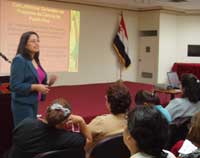
|
|
Egda was invited by the U.S. Department of State to speak about science education and teaching to other science teachers and school administrators who lived and worked in various regions of El Salvador.
|
My typical workday starts at 7:30 a.m. when I welcome my students with my best smile. Every day is very dynamic and full of excitement.
My major tasks include:
- Teaching - I have 5 periods of classes, 1 period for preparing materials, and another to work with student organizations, grading student work or attending meetings. The students finish their day at 2:30 p.m., but I stay in my classroom preparing materials for the next day.
- Meeting - I meet regularly with my colleagues in the science department and with some teachers from the mathematics department. We exchange ideas about new projects, resources available and departmental goals for the students and the school.
- Mentoring - I receive University of Puerto Rico (UPR) student teachers who are working on their science teaching practice which is required during one of their semesters. I meet with the student teachers to help them reflect about the lesson taught, the areas that can be improved, and about new activities that can be developed or modified. I also meet with the UPR supervisors to discuss the practice of the student teachers.
|
|
3. What I like best/least about my work...
|
Back to Top

|
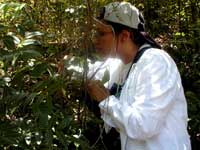
|
|
On a class field trip, Egda and her students collect water samples from plants that live in the dry forest of Guanica, Puerto Rico, to study the microbial life present within.
|
What I like best about my work is the opportunity to help my students learn biology and gain awareness of the new techniques and treatments in medicine. As a biology teacher, I also have the responsibility of helping the students appreciate the importance of using critical thinking to evaluate any information to which they are exposed. Understanding the basics of advances in science and technology may influence student’s decisions and impact their lives and our society. I also like the opportunity to help strengthen students’ self-esteem and their potential for becoming good citizens.
Working with the student teachers, I participate in the preparation of our next generation of biology teachers by exposing them to various aspects that influence the process of teaching and learning science.
What I like least about my work is the time-consuming task of grading tests. On the positive side, this is a time during which you learn about other aspects of the students based on their written responses.
|
|
4. My career goals are...
|
Back to Top

|
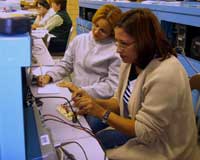
|
|
Egda attended the Collaborative Adaptive Sensing of the Atmosphere (CASA) workshop sponsored by NSF and NASA. The project's goal is to increase the warning times and forecasts of hazards like tornados, floods and hurricanes.
|
My career goals are to pursue a doctorate degree in science education, through which I hope to make contributions to the field and gain knowledge about the science reform movement, particularly in Puerto Rico. I intend to collaborate in the professional development of science teachers, particularly in areas of Biology where new knowledge has been uncovered, such as the molecular and cellular biosciences and the environmental sciences.
|
|
5. When I'm not working, I like to...
|
Back to Top

|
When I’m not working, I like to be involved in activities of professional organizations like the Puerto Rico Society of Microbiologists and the Puerto Rico Beta Chapter of Phi Delta Kappa. Also, I like to participate in different types of activities and workshops like the ones designed by community volunteer groups to learn more about areas of ecological importance. I like to go with friends and my family to visit new places in the island of Puerto Rico. We are starting to visit other islands in the Caribbean as well. I also like to read and watch videos about other cultures.
|
|
6. My teaching awards...
|
Back to Top

|
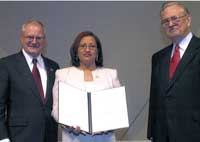
|
|
Egda accepts the Puerto Rico Presidential Award for Excellence in Science and Mathematics Teaching which was granted by the White House and National Science Foundation.
|
My teaching awards provide a glimpse of the possibility of rewards that the teaching profession offers. Nominations for special awards are granted to science teachers with effective teaching practices by professional organizations, public education policy-related organizations and different types of community-based organizations.
My teaching awards and special recognitions include:
- Puerto Rico Outstanding Biology Teacher Award, granted by the American Biology Teachers Association, 2002
- Presidential Award for Excellence in Science Teaching 2003
- The Hispanic/Puerto Rican Institute, New York dedicated their Annual Convention to me in 2004.
- The Puerto Rico Association of Sales Executives granted me an award in the Education Category in 2005.
- I was selected as an Albert Einstein Distinguished Educator Fellow granted by the Triangle Coalition for Science and Technology and the Department of Energy in 2005. My fellowship is in the Division of Molecular and Cellular Biosciences of the National Science Foundation, Washington, D.C. for a period of 11 months. It is a unique opportunity to know first-hand how a federal agency works and the process of funding the best cutting-edge science research in the United States.
|
|
|
|
 |